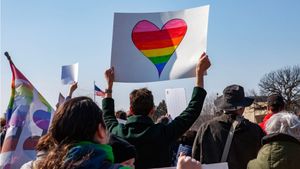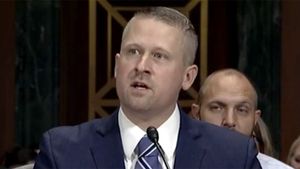In recent years, Northeastern communities have seen an increase in temperatures during Autumn that have cut the season short. Climate scientists are now saying that Fall could be disappearing altogether, and climate change is likely the cause.
Judah Cohen, director of seasonal forecasting at Atmospheric and Environmental Research, told Yahoo News that while individual changes are not yet directly linked to climate change, shifting temperatures create the weather conditions that lead to longer summers and winters, as well as lackluster foliage.
"We’re seeing this weather whiplash here in the fall, where it can be so warm, it can have record warm temperatures, and then very quickly we can transition into a very cold period,” he said. "Summers are growing longer. September, a lot of times, acts more like August than what you traditionally consider a fall month. Summer is definitely encroaching on the fall season."
As for what caused the change in seasons, Cohen believes global warming melting arctic ice is to blame. According to a study led by Cohen published in Science Magazine last year, loss of arctic ice has caused the polar vortex to stretch, which has sent cold air to southern regions at earlier dates.
"I would summarize the whipsawing from weather extremes this fall as the summation of two competing factors: ambient warming due to increasing greenhouse gases and an increase in polar vortex stretching," Cohen explained. "Climate change — but specifically the changes in the Arctic — lead to more disruptions of the polar vortex, where the polar vortex kind of stretches, or elongates, like a rubber band. And we’re definitely seeing an increase in those types of events in October through December.”
Cohen said that climate conditions may cause September to feel like August, while November feels like January. After record heat waves scorched Europe over the summer, many areas in the southern United States are now seeing early freezes. Buffalo, New York has also seen devastating snow storms before the end of November.
"I think it’s applicable to what happened this fall, because we’ve had these unusual polar-vortex-stretching events,” Cohen added. “So in October, there was this early cold weather snap and early snow. And I know places in the Southeast were having the earliest freezes ever. The cold snap that we’re seeing in November and extreme lake effects that we’re seeing here in western New York, that’s also associated with the stretched polar vortex event."
While research supports the theory that climate change is causing longer, warmer summers, scientists warn that more studies are needed to confirm the role of global warming in harsh winters. Cohen added that luckily, polar-vortex-stretching events are temporary, and warm weather can sometimes bounce back.
- 'Once in a Generation' Winter Storm Will Impact Nearly Every State - Advocate Channel ›
- Polar Bear Attacks May Be Linked to Climate Change, Experts Say - Advocate Channel ›
- Global Warming 'More Likely Than Ever' to Breach 1.5C Threshold | AdvocateChannel.com ›
- These Countries Will Be Treacherously Warm in 100 Years | AdvocateChannel.com ›
- It's Too Late to Stop Arctic Sea Ice From Melting in Summer ›
- Climate Activists Smash Glass Protecting 'The Rokeby Venus' ›
- Humanity on Track to Double Warming Limit This Century: UN ›
- Here's What to Do If Your Flight Is Delayed or Cancelled ›
- None ›



















































